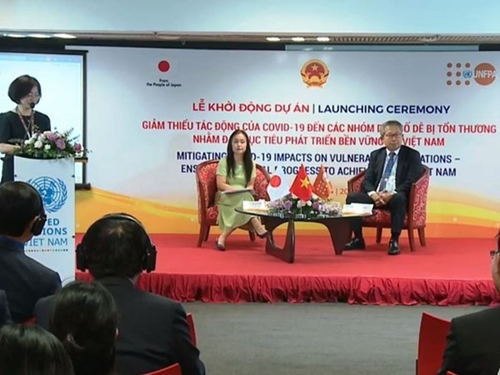The project aims to aid the Government of Vietnam’s ongoing efforts to mitigate the negative impacts of COVID-19 on vulnerable populations to ensure national progress to achieve the Sustainable Development Goals (SDGs) in Vietnam. It plans to intervene on four areas, namely gender-based violence, improvement of elderly care, sexual and reproductive health, and support for returning Vietnamese migrants.
    |
 |
|
The project was launched on April 26. |
The project will be conducted from April 2021 to March 2022 in 14 cities and provinces nationwide, including Thai Nguyen, Dien Bien, Lao Cai, Thanh Hoa, Nghe An, Ha Tinh, Da Nang, Quang Tri, Quang Nam, Dak Lak, An Giang, Can Tho, Vinh Long and Ho Chi Minh City.
Addressing the launch ceremony, Japanese Ambassador to Vietnam Takio Yamada said the COVID-19 pandemic shows people the importance of mutual understanding, sharing of resources and above all, the solidarity and cooperation among communities, societies and nations in tackling this unprecedented challenges. The new project also demonstrates the good relationship between Vietnam and Japan, he said.
Though Vietnam is one of the countries responding the most effectively to COVID-19, the social and economic consequences it has caused are of great concern, he said, vulnerable groups, such as women, girls, the elderly and adolescents, have been those hit the hardest by the pandemic.
Naomi Kitahara, UN Population Fund (UNFPA) Representative in Vietnam, said the challenges facing Vietnamese people, especially vulnerable groups, have been more complicated due to COVID-19. The pandemic is deepening the existing inequalities and exposing social gaps, she added.
For Vietnam to achieve the SDGs, it is needed to mitigate COVID-19 impacts, she continued, it is important to ensure all people are part of the sustainable development process so no one will be left behind. She expected the project will make a great leap for Vietnam to stay committed to fulfilling the SDGs.
The project plans to establish three one-stop shop services centres, run 10 creative and innovative campaigns on prevention of gender-based violence amid COVID-19 and provide training for around 500 males and females on preventing and responding to gender-based violence.
Under the project, about 1,000 elderly people will be provided with high-quality health care and support services in selected cities and provinces while some 58,000 others are expected to benefit from telehealth services.
About 5,000 ethnic minority women will benefit from a mobile application offering information and consultation on sexual and reproductive healthcare while 45 district-level public clinics will receive medical equipment to protect their health workers from COVID-19.
It will also register returning migrant workers into training courses on soft skills and comprehensive gender education and provide them with counselling in sexual and reproductive health, gender-based violence prevention and career.
Source: VNA